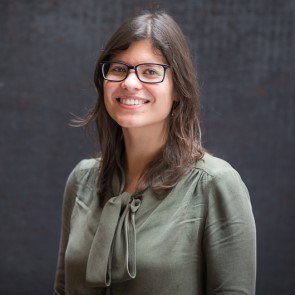
“Sonderpädagogik: Continuities and Ruptures of Eugenic Discourses in Special Needs Education”
Professional Background
Dr. Josefine Wagner received her PhD in Education jointly from the University of Lower Silesia in Wroclaw (Poland) and the University of Innsbruck (Austria) through the European Doctorate in Teacher Education (EDiTE). She also holds a BA in English and Politics, as well as an MA in Education, from the Freie Universität Berlin (Germany).
Dr. Wagner is deeply interested in Holocaust education. As a state certified English and History teacher in Germany, Dr. Wagner taught the history of the Holocaust and World War II in German high schools from 2014 to 2016. More recently, she has been teaching these topics as an instructor on international education programs in Central Europe organized by Syracuse University and The College at Brockport, The State University of New York.
For her doctoral research, Dr. Wagner investigated the impact of the UN Convention on the Rights of People with Disabilities (UNCRPD) on Central European education systems by conducting cross-cultural, ethnographic research in primary schools in Poland, Austria and Germany. Reading the UNCRPD as a fundamental paradigm shift towards inclusive mainstream education, through classroom observations and interviews with members of faculty in each of the schools she worked with, Dr. Wagner came to understand how eugenic and race hygienic rhetoric continues to inform the deficit assumptions of the “uneducable child,” and that among its practitioners, special pedagogy remains the uncontested response to disability and deviant behavior. For her dissertation she was recently awarded the 2019-2020 Conchada Delgado Gaitan Presidential Fellowship granted by the Council on Anthropology and Education of the American Anthropological Association.
Fellowship Research
Dr. Wagner was awarded Center for Holocaust Studies at the Institute for Contemporary History-Munich & Jack, Joseph and Morton Mandel Center for Advanced Holocaust Studies Exchange Scholar for her research project, “Sonderpädagogik: Continuities and Ruptures of Eugenic Discourses in Special Needs Education." While in residence, Dr. Wagner will explore Sonderpädagogik and probe questions regarding the extent to which the professionalization of special pedagogy has drawn from the Nazi-era terminology of the deficient and foreign to legitimate the contemporary migrant bias in special needs education. Drawing on Museum resources, she seeks to uncover historical foundations of discourses on racial, cultural, social and biological deviance through which special pedagogy established itself as a discipline in order to understand the continuities and ruptures of knowledge that special pedagogy creates vis-à-vis the disabled student. Furthermore, Dr. Wagner will be investigating “Ostpädagogik” and the ways through which education policies and practices in Nazi occupied Central Europe contributed to policing and destroying local student populations along the lines of racially and disabled “deficiency.” Of particular interest is the German language bias on which segregation into mainstream and special education is hinged in contemporary assessment methodology and the way that inferiority and oppression was created through language politics and pedagogy as a greater strategy for “Generalplan Ost.” Teachers, teacher educators and special pedagogues played a significant role in the realization of these greater enslavement and annihilation projects. Individual careers of these educators in the field of education and (special) pedagogy in the post-World War II East and West Germany, Austria and Poland offer interesting perspectives on continuities and ruptures of discourses in (special) pedagogy.
